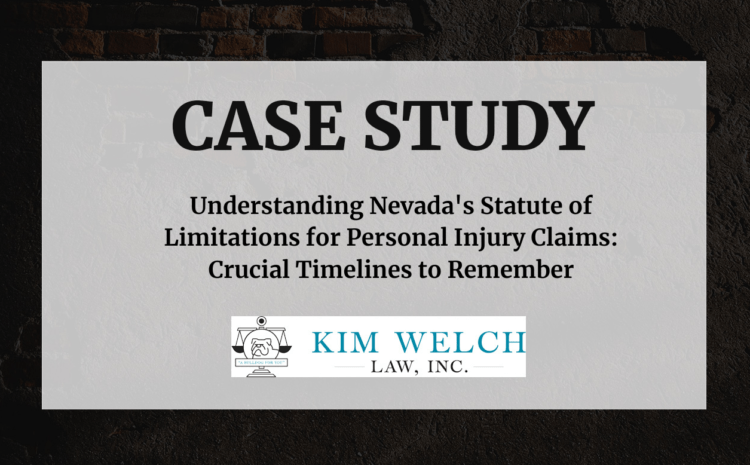
In the aftermath of a personal injury, time becomes a critical factor, not only for physical recovery but also for pursuing legal recourse. In Nevada, like in many other states, personal injury claims are subject to statutes of limitations. These legal timelines define the window of opportunity within which a lawsuit must be filed. Understanding these statutes of limitations is essential for anyone considering legal action for a personal injury. Here’s what you need to know about the statute of limitations for personal injury claims in Nevada.
What is a Statute of Limitations?
A statute of limitations is a law that sets the maximum time after an event within which legal proceedings can be initiated. In the context of personal injury claims, it establishes the deadline by which a lawsuit must be filed. Once this deadline passes, the injured party may lose their right to seek compensation through the court system.
Statute of Limitations for Personal Injury Claims in Nevada
In Nevada, the statute of limitations for most personal injury claims is two years. This means that individuals who have been injured due to the negligence or wrongful actions of others generally have two years from the date of the injury to file a lawsuit. However, there are certain exceptions and nuances to be aware of:
Discovery Rule: In some cases, the date of discovery, rather than the date of the injury, may trigger the start of the statute of limitations period. This rule applies when the injury is not immediately apparent or when it takes time for the injured party to realize the extent of their injuries.
Minority Tolling: If the injured party is a minor at the time of the injury, the statute of limitations may be tolled, or paused, until they reach the age of 18. Once the minor turns 18, they typically have two years from that date to file a lawsuit.
Government Claims: Claims against government entities, such as injuries sustained on public property or due to the actions of government employees, have a shorter statute of limitations. In Nevada, claims against governmental entities must typically be filed within one year of the injury.
Medical Malpractice: Medical malpractice claims in Nevada have a separate statute of limitations. Generally, these claims must be filed within three years from the date of the alleged malpractice or one year from the date of discovery, whichever comes first.
Why Are Statutes of Limitations Important?
Statutes of limitations serve several important purposes in the legal system:
Preservation of Evidence: Prompt filing of claims helps ensure that evidence remains fresh and readily available, increasing the likelihood of a fair resolution.
Protection of Defendants: Defendants have a right to be protected from stale claims and potential liability for events that occurred in the distant past.
Judicial Efficiency: Statutes of limitations help promote the efficient administration of justice by encouraging timely resolution of legal disputes.
What Happens If You Miss the Deadline?
If you fail to file a personal injury lawsuit within the applicable statute of limitations period, you may lose your right to seek compensation through the court system. The defendant can raise the statute of limitations as a defense, and the court is likely to dismiss the case.
Seeking Legal Guidance
Given the complexities of statutes of limitations and their exceptions, it’s crucial to seek legal guidance if you’re considering filing a personal injury claim in Nevada. A knowledgeable personal injury attorney can assess your case, determine the applicable deadlines, and ensure that your rights are protected.
In conclusion, understanding Nevada’s statute of limitations for personal injury claims is essential for anyone considering legal action after an injury. By being aware of these crucial deadlines and seeking timely legal assistance, injured parties can take the necessary steps to protect their rights and pursue the compensation they deserve.
Contact Us.
Anyone can suffer an accident at any time. Contacting an injury attorney as soon as possible after the accident can mean the difference between a sizeable financial compensation and an unfair settlement.
Kim Welch Law will fight for you. Schedule a free consultation today! Connect with us on Facebook here!
